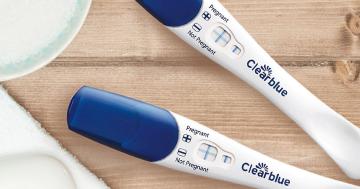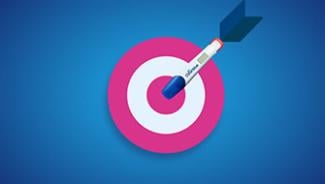How many pregnancy tests should I take?

Have you ever taken a pregnancy test and then immediately taken a second test? Look, we get it. No matter the result, you want to make sure it’s right. But here’s the truth: Usually it’s a waste of a test to take two tests one right after the other. Here we share guidance on whether you should test again and if so, when.
How do pregnancy tests work?
In order to know how many pregnancy tests you should take, it helps to understand how pregnancy tests use human chorionic gonadotropin (hCG) to detect pregnancy. When a fertilized egg implants into your uterine wall, the placenta begins to grow, generating hCG, which can then be found in your bloodstream and urine.1 Some early detection pregnancy tests can detect hCG in your urine a few days sooner than your missed period. This could be up to six days before your missed period or five days before your expected period, depending on the pregnancy test. So, if you take a pregnancy test the morning after you have sex, that’s too early to determine if you’re pregnant or not.
How accurate is a pregnancy test?
All Clearblue® tests are over 99% accurate from the day you expect your period.2 The Clearblue® Early Detection Pregnancy Test and the Clearblue® Early Digital Pregnancy Test can detect 77% and 78% respectively, of pregnancies six days before your missed period (five days before your expected period).
When is a pregnancy test most accurate?
Pregnancy tests are most accurate after you’ve missed your period, as long as you’ve calculated your expected period start date correctly. Different tests will have different levels of accuracy. Read the instruction leaflet for your specific test.
How many pregnancy tests should I take?
When deciding how many pregnancy tests to take, keep two things in mind: All Clearblue® tests are over 99% accurate from the day you expect your period.2 And false positives are rare. If you take a test on or after the day you expect your period and get a positive result, you can be sure of the result. If you get a negative result, you may have miscalculated the day your period is due. Test again in three days if your period has still not arrived. If this test is also negative, see your healthcare professional.
Now let’s look at this question through the lens of some different scenarios.
What if I’m a first-time tester or it’s been a hot minute?
The instruction leaflet that came with your test is your best friend. Read it! Here’s an example. Clearblue® instruction leaflets will not only tell you if and when you should test, but also how to take the test, how long to wait after you take the test to read the results and how to understand these results. It will also answer many questions you might have related to accuracy, timing, different factors that might affect your test results, if and when to take another test, and more.
What if I get a negative result but I don’t trust it?
If you test before your expected period and get a negative result, you may have miscalculated your menstrual cycle length, the level of hCG in your urine may be too low to detect, you might have misunderstood the instructions, you might’ve drank too much water, or you didn’t use the first urine of the day. You also might not be pregnant. You should test again when your period is due. If the result is still negative, but your period hasn’t started, you should see your healthcare professional.
What if I have irregular periods?
Irregular periods can make it difficult to know when your period is due/when to expect your period — and when you should test. Following this guidance may help.
If you have irregular periods and you get a positive test result, remember that false positives are rare. You don’t need to test again. Call your healthcare professional.
If you have irregular periods, the test result was negative, and you’re not sure when your period is expected to start, wait three days and then test again. If this test is also negative and your period still has not arrived, call your healthcare professional.
What if I get mixed pregnancy test results?
It’s possible to get a negative pregnancy test result followed by a positive result, especially if you tested early. This is because hCG levels rise rapidly in the first few days after implantation.
It’s also possible to get a positive test result followed by a negative result. If you use two different pregnancy tests, this could be the result of varying test sensitivity. Wait a few days and test again.
You also may no longer be pregnant. This is called early pregnancy loss, which does sometimes happen.3 It is often difficult and heartbreaking, though most people have a healthy pregnancy afterwards.3 If you think you’re experiencing an early pregnancy loss, talk to your healthcare professional as soon as possible. Know that repeated early pregnancy loss is uncommon.3
What if I see a faint line on the pregnancy test?
If you see a test line in addition to a control line on your pregnancy test — no matter how faint it is — your result is “pregnant” and you don’t need to test again. This is because pregnancy tests work by detecting levels of the pregnancy hormone hCG, which is normally only present if you’re pregnant.
You may have heard of “phantom hCG,” which is when a patient tests positive for hCG when they are not pregnant.4 This can happen if you’re taking fertility medications that contain hCG, you have a rare medical condition such as an ovarian cyst, you’re perimenopausal or menopausal, or you’ve recently had a birth, miscarriage or termination.5,6
When using Clearblue® tests, faint result lines (or negative results!) can occur if:
- Your hCG levels aren’t very high due to testing early.
- You drank too much liquid before testing.
- You didn’t test first thing in the morning (if testing early).
If you’re worried about faint lines, consider taking the Clearblue® Early Digital Pregnancy Test which provides clear results in words: “Pregnant” or “Not Pregnant.”
How long should I wait between pregnancy tests?
You should take another test if:
- You used an expired test.
- You drank an excessive amount of fluids before you took the first test.
- You think you may have used the test incorrectly or you got a test error.
You may want to take another test in three days if:
- You have not had your period or a positive pregnancy test result.
- You’re not sure if you calculated your menstrual cycle correctly.
- You tested early.
We know it can be super tempting to take multiple pregnancy tests to confirm a result or to try to get a different one. But here’s the bottom line: If the test hasn’t expired, and if you followed the instructions carefully and you haven’t miscalculated your menstrual cycle length, your Clearblue® pregnancy test is over 99% accurate at detecting pregnancy from the day you expect your period.2 If you get a negative result and your period has still not arrived, test again in three days. If this test is also negative and your period still has not arrived, see your healthcare professional.
Related Articles
- How to buy a pregnancy test without anyone knowing
- Common foods and drinks: What can affect a pregnancy test result?
- Make the most of 3 minutes: How to wait for your pregnancy test results
Sources and Disclaimers
- Cleveland Clinic. Human chorionic gonadotropin. Updated March 11, 2022. Accessed February 6, 2024. https://my.clevelandclinic.org/health/articles/22489-human-chorionic-gonadotropin
- >99% accurate at detecting typical pregnancy hormone levels. Note that hormone levels vary. See insert.
- The American College of Obstetricians and Gynecologists. Early pregnancy loss. Updated May 2023. Accessed February 6, 2024. https://www.acog.org/womens-health/faqs/early-pregnancy-loss
- Oyatogun O, Sandhu M, Barata-Kirby S, Tuller E, Schust DJ. A rational diagnostic approach to the "phantom hCG" and other clinical scenarios in which a patient is thought to be pregnant but is not. Ther Adv Reprod Health. 2021;15:26334941211016412. doi: 10.1177/26334941211016412. Accessed February 6, 2024. https://www.ncbi.nlm.nih.gov/pmc/articles/PMC8207263/
- Gnoth C, Johnson S. Strips of hope: accuracy of home pregnancy tests and new developments. Geburtshilfe Frauenheilkd. 2014;74(7):661-669. doi: 10.1055/s-0034-1368589. Accessed January 30, 2024. https://www.ncbi.nlm.nih.gov/pmc/articles/PMC4119102/
- Betz D, Fane K. StatPearls [Internet]. Human chorionic gonadotropin. Updated August 14, 2023. Accessed January 30, 2024. https://www.ncbi.nlm.nih.gov/books/NBK532950/

What are the early signs of pregnancy?
There are various symptoms that can indicate you might be pregnant, even if you might not experience any/all of them.

How to use a pregnancy test
When and how you can test depends on the test you use, but in this article you will find everything you need to know before starting a test.







